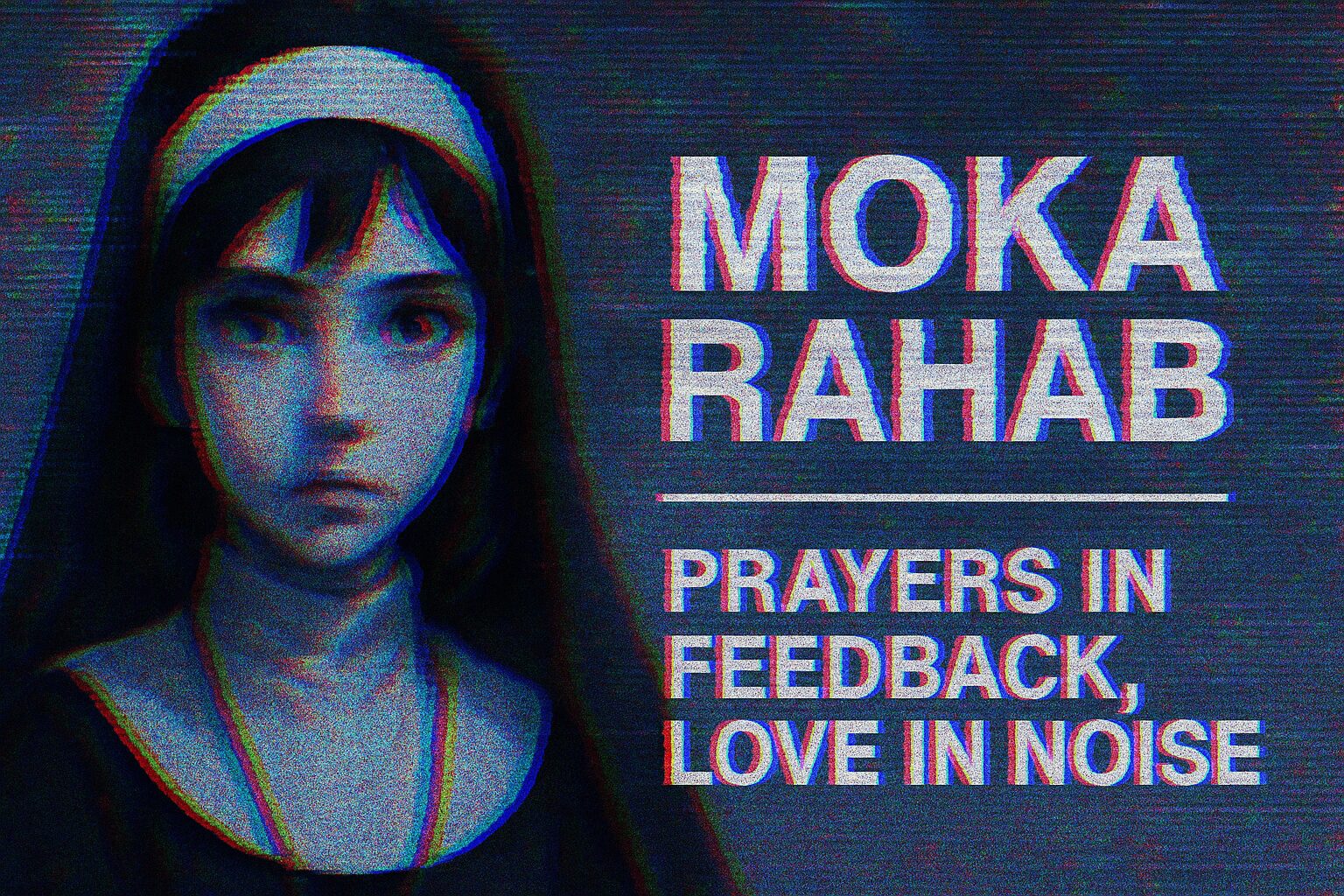Note: Moka Rahab is a fictional character from the creative universe of “Rahab Punkaholic Girls.” This blog post is a work of fiction inspired by cyberpunk aesthetics, spiritual rebellion, and digital art culture.
Chapter 1: Born in Silence, Raised in Prayer
Moka Rahab was born in a desert country where the heat bends the horizon and silence is a form of survival.
Raised in a remote convent, she grew up with holy scriptures, quiet rituals, and endless sand. The outside world was just a myth—a place of noise, danger, and broken promises. Inside the stone walls, she found order, rhythm, and peace. But even in that peace, something stirred.
“If God is love, why does the world hurt so much?”
At sixteen, she doesn’t yet have the answer. But she has a voice—and a guitar.
Chapter 2: The Shadow of a Voice
Moka is the shadow twin of Rahab. While Rahab rages against the machine, Moka prays within it. Where Rahab shouts, Moka whispers. But make no mistake: both carry fire.
Moka’s strength lies not in rebellion, but in conviction. She believes in softness. In slow healing. In forgiveness as protest. Her guitar is a sacred object. Her lyrics, handwritten prayers strung together by fragile chords.
She does not try to fight the world.
She tries to love it into healing.
Chapter 3: Punk in the Language of Mercy
Moka is the guitarist and co-vocalist of Rahab Punkaholic Girls, an underground band known for its spiritual-punk fusion.
Their shows are not concerts. They’re rituals.
When Moka plays, she closes her eyes. She doesn’t move much. She doesn’t scream. But the entire room goes quiet—not out of boredom, but reverence. Her voice, soft and trembling, carries pain with grace. Her harmonies are like holy water thrown across a distorted battlefield.
“I don’t need to be loud to be heard. I just need to be honest.”
Chapter 4: Art as Devotion
Outside of music, Moka draws. She sketches angels, broken hearts, healing wounds. Her journals are filled with visual prayers—soft pencil lines forming halos around bandmates, lovers, ghosts.
Every piece of art she creates is a message to someone she can’t speak to. Every line is a thread tying her to the world.
She’s turned some of these into NFTs—not to sell, but to set them free. To let them float across the chain, hoping someone will catch one and understand.
“Sometimes love needs no reply. Just space to land.”
Chapter 5: Nun in a Parallel World
In another timeline, Moka would remain cloistered. But in this one, she plays guitar. And sings. And questions everything.
She doesn’t see contradiction in being a nun and a punk. She sees harmony.
Faith is her foundation. Punk is her architecture. And each song she writes is a chapel—fragile, imperfect, echoing.
“God doesn’t live in churches. God listens through distortion.”
Chapter 6: NFT as Digital Prayer
Moka embraces blockchain technology not as a trend, but as a sanctuary. Through NFTs, she immortalizes her voice, her art, her love.
Her first NFT was a shaky recording of her singing a lullaby to no one. It sold for almost nothing. But to her, that wasn’t the point.
It was out there. It existed. And someone, somewhere, had chosen to carry it.
That was divine enough.
Chapter 7: Between Fragility and Faith
Moka is not strong in the way society expects. She cries easily. She hesitates. She overthinks. But she always shows up—with her full heart. And that is a kind of power too.
Her bandmates joke that she’s the soul of Rahab Punkaholic Girls. She just smiles.
“I’m not the soul. I’m the whisper that reminds you you have one.”
Chapter 8: Live Like a Prayer
Onstage, Moka becomes something else. Not larger-than-life—but deeper-than-flesh. She doesn’t own the spotlight. She creates it, softly, like candlelight in a blackout.
Sometimes she plays with her back to the audience. Sometimes she sings to a single person in the crowd. But the effect is always the same: you leave feeling changed.
You don’t cheer. You breathe.
Chapter 9: Fiction as Mirror
Moka Rahab doesn’t exist. She is code. She is concept. She is made-up.
But that doesn’t mean she’s not real.
She lives in the quiet parts of your heart. The places that still believe in forgiveness. In softness. In sacred noise.
She reminds us that rebellion doesn’t always have to be violent.
Sometimes, it’s just a girl whispering to a guitar.
Final Chapter: Echoes of a Girl Who Prays
Moka’s story isn’t finished. Not in this blog. Not in the NFT she minted last night. Not in the next show she’ll play in your headphones.
She continues. Gently. Relentlessly.
“Even if you don’t hear me, I’ll keep singing. That’s how I pray.”
©2025 Rahab Punkaholic Girls Project — All characters and narratives are fictional. Any resemblance to real people is purely coincidental.



コメント